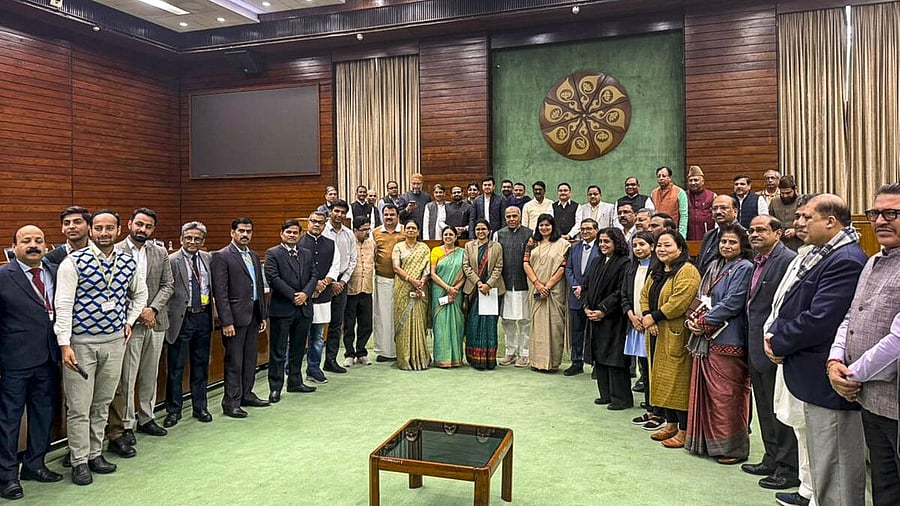
embers of the Joint Parliamentary Committee after a meeting on the Waqf Amendment Bill, in New Delhi.
Credit: PTI Photo
New Delhi: The Joint Parliamentary Committee (JPC) on Wednesday adopted its report on the contentious Waqf (Amendment) Bill, 2024 containing changes suggested by NDA MPs, with sources saying that several Opposition lawmakers submitted their dissent notes with two of them even calling it “Waqf Annihilation Bill”.
The report, which was adopted by a 15-11 vote, will now be presented before Speaker Om Birla on Thursday by panel chairperson Jagadambika Pal, a BJP MP, and it is likely to be tabled in the first leg of Budget Session starting this Friday.
Sources said at least nine Opposition MPs have submitted their dissent notes by the deadline even as ruling BJP MPs argued that the Bill seeks to bring modernity, transparency and accountability in the management of Waqf properties.
The panel has recommended the government to bring a law to prevent declaration of tribal land as ‘waqf’ property while suggesting some amendments moved by BJP MPs, including assigning an officer above the rank of Collector to settle disputes and reinstating a person with knowledge of Muslim law and jurisprudence as third member in the Tribunal, to be included in the Bill.
Pal told reporters that many of the amendments approved by the committee have addressed concerns of opposition MPs as well and the Bill once enacted will help Waqf Boards in discharging its duties transparently and more effectively.
However, sources said the dissent notes submitted by Opposition MPs were critical of the Bill and questioned its rationale while arguing that many of the proposed amendments violated the fundamental right to freedom of religion.
DMK MP A Raja and Mohd Abdullah, sources said, wrote in their dissent note that the Bill should be titled “Waqf Annihilation Bill”, as the proposed legislation is nothing but a "surreptitious attempt" to remove provisions which were added in law over the years.
In his dissent note running into 231 pages with annexures, AIMIM MP Asaduddin Owaisi said the Bill was designed to “disempower waqfs, take away their management from the hands of Muslims, create hurdles in their efficient administration and hamper the progress of their development”.
While raising concerns over inclusion of non-Muslims in the management of Waqf properties, he also referred to recent instances of petitions seeking survey of mosques to ascertain whether temples existed earlier in such premises.
“At a time when divisive elements have raised mischievous claims questioning the status of ancient mosques and dargahs as places of Muslim religious worship, the Bill seeks to weaken the defence of the Muslim side in these disputes by removing the statutory recognition given to ‘waqfs-by-user’,” he said.
Congress Lok Sabha Deputy Leader Gaurav Gogoi said the panel providing some relief to ‘waqfs by user’ properties was inadequate as “any bad-faith actor” can file a petition and consequently prevent it from seeking any protection under the proposed law.
Trinamool Congress MPs Kalyan Banerjee and Nadimul Haque “opposed” the Bill in its entirety while calling it “wholly perverse and not sustainable”, as it “clearly violates” the rights of the Muslim, as protected under Article 26 of the Constitution.
A joint dissent note by Congress MPs Syed Naseer Hussain, Imran Masood and Mohd Jawaid alleged that the Bill appears driven by a "political agenda rather than genuine concerns".
They said the Bill undermines democratic governance by replacing elected members of Waqf Boards and the Central Waqf Council with government nominees, reducing Muslim representation and violating constitutional rights under Articles 25 and 26.
"By imposing arbitrary conditions on the creation of Waqf, such as requiring the donor to have practiced Islam for five years, the Bill contradicts Islamic jurisprudence. Such conditions are discriminatory, particularly when similar religious endowment laws for other communities impose no such restrictions," they said.
